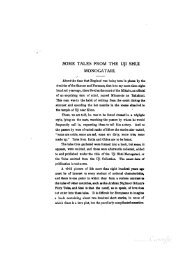Chau Ju-Kua - University of Oregon Libraries
Chau Ju-Kua - University of Oregon Libraries
Chau Ju-Kua - University of Oregon Libraries
You also want an ePaper? Increase the reach of your titles
YUMPU automatically turns print PDFs into web optimized ePapers that Google loves.
1,16 MALABAK. §9<br />
(^ W: cloves, lump-camphor (nau-izi), sandal-wood, cardamoms and<br />
gham-wood '^.<br />
Ku-lin may le reached in five days with the monsoon from Nan-p'i.<br />
«It takes a Ts'uan-chou ship over forty days to reach Lan-li (^ ||_<br />
i. e.,<br />
5 Lan-wu-li); there the winter is spent, and, the following ye^ a further<br />
voyage <strong>of</strong> a month will take it to this country» ^l<br />
The customs <strong>of</strong> the people are, on the whole, not different from those<br />
<strong>of</strong> the Nan-p'i people. The native products comprise cocoanuts and sapan-<br />
wood; for wine they use a mixture <strong>of</strong> honey (^ ||) with -cocoanuts and the<br />
10 juice <strong>of</strong> a flower, which they let ferment".<br />
turbanss ^^.<br />
«They are fond <strong>of</strong> archery; in battle they wrap their hair in silken<br />
For the purpose <strong>of</strong> trade they use coins <strong>of</strong> gold and silver; twelve silver<br />
coins are worth one gold one. The country is warm and has no cold season.<br />
15 Every year ships come to this country from San-fo-ts'i, Kien-pi and<br />
Ki-t'o^" (± jjjg)^ and the articles they trade with are the same as in Nan-p'i.<br />
«Great numbers <strong>of</strong> Ta-shi live in this country. Whenever they (i. e.,<br />
the inhabitants) have taken a bath, they anoint their bodies with yu-hin<br />
(^ :^); as they like to have their bodies gilt like that <strong>of</strong> a Buddha» ".<br />
20 Notes.<br />
1) Or more correctly «tlie country <strong>of</strong> the ]Sfan-p'i», or Nairs <strong>of</strong> Malabar. Tlie name Nan-p'i<br />
does not occur, it is believed, prior to Cbau <strong>Ju</strong>-kua. In the light <strong>of</strong> the list <strong>of</strong> dependencies <strong>of</strong><br />
Nan-p'i given by our author in a subsequent passage <strong>of</strong> this chapter, the supremacy <strong>of</strong> the Malabars<br />
extended from Xellore to Cambay, and, as we have learned from a previous passage (supra, p. 72),<br />
25 comprised also the island <strong>of</strong> Ceylon.<br />
The Si-yang chau-kung tien-lu, 3,3, which is a record <strong>of</strong> the famous expedition <strong>of</strong> the<br />
eunuch Ch'6ng-Ho, about A. D. 1430, speaking <strong>of</strong> the inhabitants <strong>of</strong> Calicut, says that there were<br />
five castes, the Nan-p'i, the Hui-hui or Moslims, the Chi-t'i {^)t JHi) or Chittis, the Ko-ling<br />
("hb -^) or Klings, and the Mu-kua {"^^ ;QX) "i' Mukuva, a name applied to the fishermen<br />
30 <strong>of</strong> the western coast <strong>of</strong> the Peninsula near Cape Comorin. Phillips, J. K. A. S. 1896, 342, gives<br />
the first name as Nan-k'un (^a .^)' ^^^ *^ °^ opinion that it also transcribes the name Nair.<br />
The characters Tcun and pi differ so slightly that a copyist may have easily confounded th^m.<br />
The time here stated as necessary to make the voyage from San-fo-ts'i to the Nan-p'i<br />
country is the same as that usually given to make the voyage from the former port to Quilon. In<br />
35 a silbsequent passage (infra, p. 89) our author says it takes a ship sailing with the monsoon five days<br />
to reach Quilon from Nan-p'i; it would appear therefore that Nan-p'i, or the principal port <strong>of</strong> the<br />
Nan-p'i, was really, as our author says, «in the extreme south-westa <strong>of</strong> the Peninsula.<br />
2) Mie-a-mo, in Cantonese dialect Mit-a-maf, may be the same as the Ma (or Mo)-Ii-mo<br />
<strong>of</strong> Chan's list <strong>of</strong> dependencies <strong>of</strong> Nan-p'i, and both may transcribe the name Malabar, which<br />
40 country in another passage (Pt. II, Ch. XXVII) he calls Wu-li-pa (in Cantonese Ma-li-pat).<br />
Li-ssi means ((controller <strong>of</strong> sacrifices, priestn. No explanation suggests itself.<br />
3) Edrisi (I, 177 Jaubert's transl.) speaking <strong>of</strong> the Raja <strong>of</strong> Malwa — the Balhara, says:<br />
((He has troops and elephants He wears on his head a golden crown .... He rides much on<br />
horseback, particularly once a week accompanied solely by women, numbering a hundred; they

















